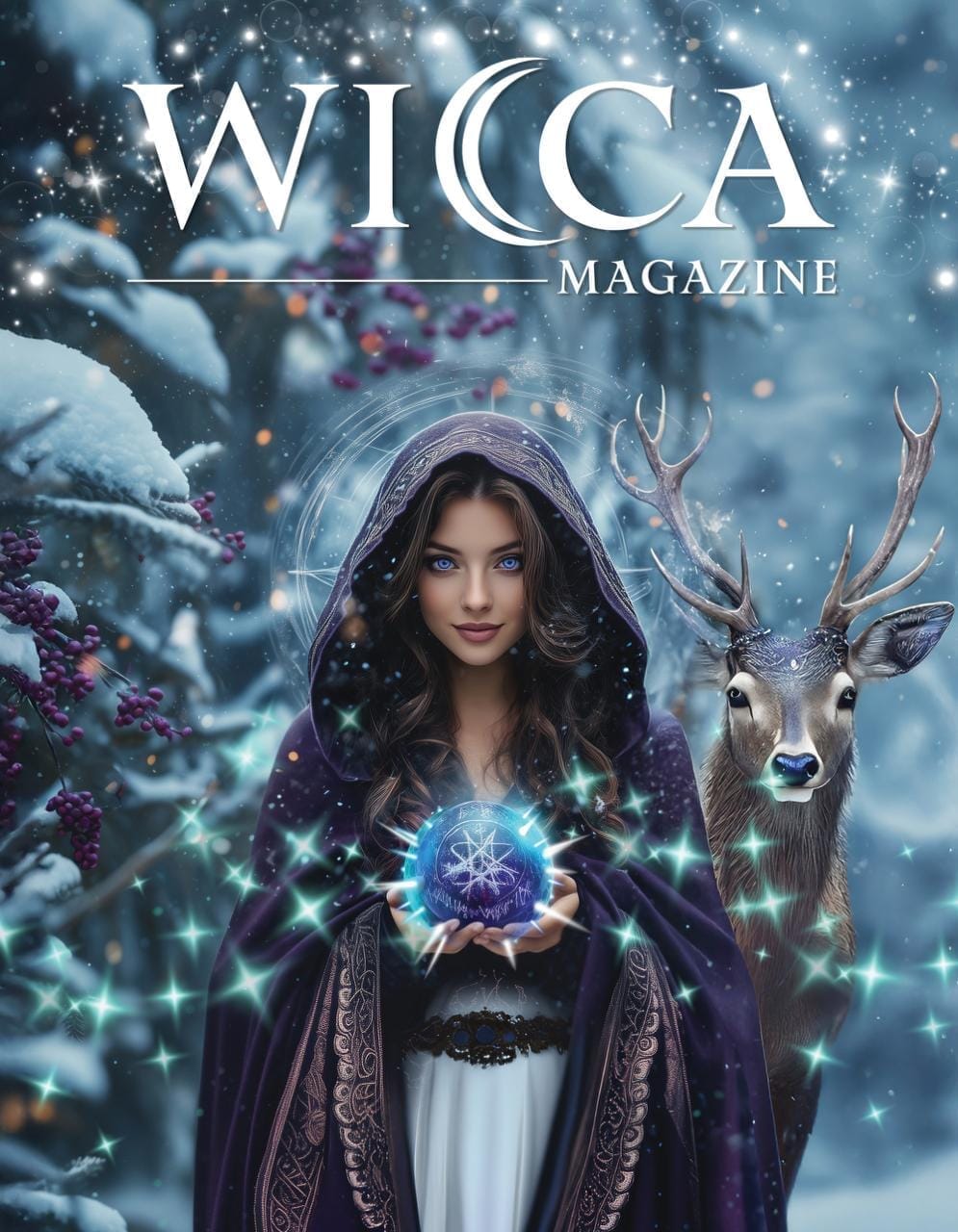


Unlock the Magick of Yule! - Your Wicca Magazine Issue Awaits
Step into the season of light with Wicca Magazine. Each digital issue is a sacred offering of spells, rituals, and Wiccan wisdom — honoring ancient paths and empowering your modern magick. Your craft, your journey, your magickal sanctuary.
Who comes to mind when we mention “The Mother of Modern Wicca”? If it isn't Doreen Valiente, then please allow us to introduce you to one of the most revered and respected women in the craft. Not only was she the first woman to indelibly make her mark on the community, but, arguably, the community would not exist in its current state if she hadn't forged her influence and become one of the most important people in Wicca. Her life was full of fascination, intrigue, and a few quarrels, which only added to her notoriety. So let's discover everything we can about the Mother of Modern Wicca, Doreen Valiente.
The History of Doreen Valiente
Doreen Edith Dominy was born to two conventional parents, Harry and Edith, on January 4, 1922, in Surrey, a southeastern county outside London. As one might imagine, she was an unusual child and had difficulty fitting in with her family and peers. This gap worsened after her first spiritual experience as a child. She was staring at the moon when a powerful sensation came over her that allowed her to “see through” into the higher realms. After that, she became quite obsessed with magick and the metaphysical, checking out any book on the occult she could find from her local library. That caused alarm to her parents, who were Methodist Christians and worried that she was heading down a dark path. In an attempt to rid her of, what they believed to be, her troublesome beliefs, they sent her to a convent when she was thirteen. As you can imagine, she hated it and left when she was fifteen, never to return.
She dreamt of attending art school but found employment as a clerk for an unemployment bureau. During the Second World War, she secured a post as a translator at the renowned Bletchley Park, where she would meet her first husband, Joanis Vlachopoulos, on assignment in South Wales. Sadly, their romance would not last as Joanis was killed during a U-boat sinking in 1941 off the West African Coast. Grief-stricken, Valiente carried on working for various intelligence operations until 1943, when she was transferred to London to work on message decryption. That is where she would meet Casimiro Valiente, whom she would marry in 1944. After the war, the pair would move to Bournemouth, where Casimiro would find work as a chef, and Doreen would dive deeper into the world of the occult.
She began to practice ceremonial magick with her friend “Zerki” using the notebooks she had acquired from a recently deceased doctor who was a member of the Alpha et Omega, an offshoot of the Hermetic Order of the Golden Dawn. During this time, she also discovered the writings of Aleister Crowley, which she devoured with enthusiasm.
In 1952 she read an article about the new Folklore Centre of Superstition and Witchcraft opening on the Isle of Man. Highlighted in the article was their 'resident witch' Gerald Gardner.
Wasting no time, Valiente wrote to Gardner and soon developed a back and forth with him, which turned into a friendship. He would introduce her to his tradition of magick that he coined Gardnerian Wicca. In 1953 Gardner initiated Valiente into Wicca, something that she kept hidden from her husband and mother, fearing that they would disapprove. Soon after, Valiente was introduced to Gardner's Bricket Wood coven, where she would quickly rise through the ranks to become High Priestess.
As Valiente delved more into Gardner's writings and teachings, she soon discovered that he had copied much of his work from Aleister Crowley. With his permission, she rewrote Gardner's Book of Shadows in an attempt to distance their branch of Wicca from Crowley's, which had developed a rather seedy reputation.
In the mid-'50s, tensions began to build between Valiente and Gardner, creating a split in the coven. Gardner was a very outspoken, publicity-seeking person who loved sharing the inner secrets of Wicca with the press. Something that would often negatively affect him and the coven. In contrast, Valiente preferred to keep their secrets hidden and held firmly among their members. This led Valiente and her followers to draft a list of proposed rules for the craft in an attempt to bar Gardner from his publicity-seeking ventures. Gardner was none too pleased with their proposal, saying that it was not needed. In turn, he sent back what he called The Wiccan Laws, which limited the control of the High Priestess. This angered Valiente and her followers, who soon decided to leave the Bricket Wood coven in 1957, creating the first real schism in Wicca.
However, thankfully the two would mend their relationship in the early sixties and remain friends until Gardner died in 1964.
Getting the Word Out
Ironically, in the early ‘60s, Valiente broke her own rules and started coming out more publicly about being a Wiccan. She wrote articles, was interviewed by journalists, and appeared on television and the radio. She also joined the Witchcraft Research Association, becoming its second president. On the Association's Halloween dinner of 1964, Valiente proclaimed the Wiccan Rede, which many Wiccans live by to this day: “An it harm none do what ye will.”
A Wrong Turn
Even though Valiente is revered in the world of Wicca, we would be remiss to leave out a rather unfortunate chapter of her life. In the early 1970s, she joined the National Front, a white nationalist political party. She also joined an even more extreme party known as the Northern League. She remained a member for roughly eighteen months before submitting her resignation, stating that she did not support the group's stance on women's liberation, sex education, and gay rights.
It should be noted that, due to her past working as an intelligence officer for the British government, there are some theories that her memberships were only guises to investigate the parties more closely and report back. However, Valiente never confessed to that, so it is anyone's guess as to why she would join up with such unfavorable groups.
Doreen Valiente's Collected Works
Valiente has quite the collection of published works that have contributed to her being called the Mother of Modern Wicca. In 1953 she wrote a Yule invocation ritual called Queen of the Moon, Queen of the Stars. With Gardner, she wrote The Witches Rune, which is chanted while dancing in a circle. She also helped Gardner prepare his non-fiction book about Wicca, The Meaning of Witchcraft.
One of her most noteworthy works is her re-writing of The Charge of the Goddess. Some believe this was her single greatest contribution to Wicca, as her version became the most important expression of Wiccan spirituality in the coming years.
Her first full-length book was published in 1962 by the name of Where Witchcraft Lives. The book was an expertly researched recounting of the history of Wicca in Britain.
In 1973, she would be published again with An ABC of Witchcraft, an extensive overview of numerous topics related to Wicca and esotericism.
That would be followed up in 1975 with Natural Magic and Witchcraft for Tomorrow in 1978. The latter explained to the reader how they could initiate themselves into Wicca and establish their own coven. Before that, it was believed that one could only be initiated by a practicing head of an established coven. Valiente gave that power back to the individual and sparked a swell of solitary witches who preferred to practice alone.
Her last book was published in 1898, titled The Rebirth of Witchcraft,which was an examination of her own place in Wiccan history.
Doreen Valiente's Legacy
Valiente died of pancreatic cancer on September 1, 1999. Her coffin was cremated, and her ashes were spread in the woods of Sussex. All of her earthly belongings were left to her dear friend John Belham-Payne who would later create the Doreen Valiente Foundation, which retains ownership of all her works and possessions.
Even with the dark stain on her past, Valiente continues to be an honored and respected person in the world of Wicca. Her contributions are vast and incredibly informative, often making her one of the first teachers of new Wiccans. Her books are well researched and still some of the most readable on the subject of witchcraft, topping many Wiccan book lists online.
Despite how you may view her, it is difficult to disagree with the fact that she helped sculpt modern Wicca into what it is today. She brought it out of the closet and introduced the craft to many who would never have been exposed to it without her. Her strong will and determination helped her commit to her lifelong desire to live her own truth, something that was certainly not easy in her time. And so, to the Mother of Modern Wicca, we say thank you for all you have done and all you continue to do for the community.